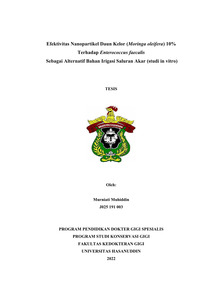Muhiddin, Murniati (2022) Efektivitas Nanopartikel Daun Kelor (Moringa oleifera) 10% Terhadap Enterococcus faecalis Sebagai Alternatif Bahan Irigasi Saluran Akar (studi in vitro) = Effectiveness of 10% Moringa oleifera Nanoparticles on Enterococcus faecalis as an Alternative Root Canal Irrigant (in vitro study). Thesis thesis, Universitas Hasanuddin.
![[thumbnail of Cover]](/18344/1.hassmallThumbnailVersion/J025191003_tesis_02-08-2022%20cover1.png)

J025191003_tesis_02-08-2022 cover1.png
Download (156kB) | Preview
J025191003_tesis_02-08-2022 1-2.pdf
Download (664kB)
J025191003_tesis_02-08-2022 dp.pdf
Download (1MB)
J025191003_tesis_02-08-2022.pdf
Restricted to Repository staff only
Download (2MB)
Abstract (Abstrak)
The aim of endodontic treatment is to eliminate infection and prevent reinfection of the root canal. One of the important steps to achieve that goal is cleaning and shaping by instrumentation and root canal irrigation. Enterococcus faecalis is bacteria with a high prevalence in persistent and asymptomatic infections. Sodium hypochlorite (NaOCl) and chlorhexidine (CHX) are frequently used irrigants. They have ability to inhibit the growth of Enterococcus faecalis, but toxic. Moringa oleifera is a natural ingredient, which has antibacterial activity because it contains saponin, flavonoid, tannin and alkaloid. Manufacturing in the form of nanoparticles can increase the effectiveness of Moringa oleifera. Objective: This study aims to determine the antibacterial effect of 5% and 10% Moringa leaf extract nanoparticles (Moringa oleifera) on the number of Enterococcus faecalis. Methods: This study used 30 mandibular premolars, divided into five groups. Group 1 irrigated distilled water as a negative control, group II irrigated 5% Moringa oleifera nanoparticles, group III irrigated 10% Moringa oleifera nanoparticles, group IV irrigated 5,25% NaOCl as a positive control I, and group V irrigated CHX 2% as positive control II. Total Plate Count used to count the number of Enterococcus faecalis bacteria after treated with Moringa oleifera nanoparticles. Result: Kruskal Wallis test showed a significant difference (p=0.00) between all irrigants for decreasing the number of Enterococcus faecalis. Moringa oleifera nanoparticles group showed that the higher the concentration, the number of bacteria also decreased. Conclusion: The antibacterial effectiveness of 10% Moringa oleifera extract nanoparticle solution was not significantly different compared to 5,25% NaOCl and 2% CHX in reducing the number of Enterococcus faecalis.
Keywords : Antibacterial, Enterococcus faecalis, nanoparticles, Moringa oleifera
| Item Type: | Thesis (Thesis) |
|---|---|
| Uncontrolled Keywords: | Antibacterial, Enterococcus faecalis, nanoparticles, Moringa oleifera |
| Subjects: | R Medicine > RK Dentistry |
| Divisions (Program Studi): | Fakultas Pendidikan Dokter Gigi > PPDGS - Ilmu Konservasi Gigi |
| Depositing User: | S.Sos Rasman - |
| Date Deposited: | 24 Aug 2022 01:28 |
| Last Modified: | 24 Aug 2022 01:28 |
| URI: | http://repository.unhas.ac.id:443/id/eprint/18344 |


